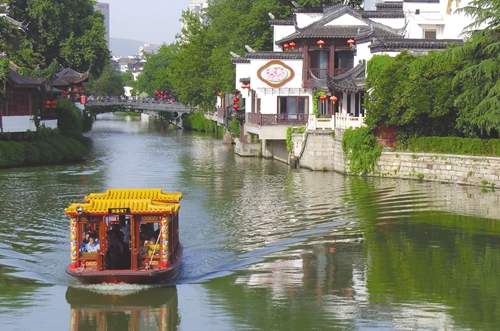HOME >> ARTS
Spring Festival travel guide for expats
Source:Global Times Published: 2020/1/14 18:23:21

People take a boat ride in Yangzhou, East China's Jiangsu Province. Photo: CNSphoto
The Spring Festival is a time for family gathering. If you are an expat in China and plan to stay during the holiday season, this makes for a great opportunity to travel to a lesser known city and experience some local culture.Take Yangzhou, a city in East China's Jiangsu Province for instance. It is a great place for tasting some delicious local cuisine while enjoying the scenery. Or for those who are more adventurous, you can treat yourself to a spa-like zaotang experience in the city.
Yangzhou cuisine
The Spring Festival Eve dinner in Yangzhou, like many parts of China, includes certain dishes associated with auspiciousness, such as fish. In Chinese, the word for fish, yu, sounds the same as a word that means "surplus" and "abundance." Another example of an auspicious dish are snap peas, which are called andou in Yangzhou, the literal translation of which is "peaceful peas."
Huaiyang cuisine, one of the eight major cuisines in China, is primarily composed of the food culture of Huaian and Yangzhou. Among the wide selection of dishes in Yangzhou cuisine, the Global Times recommends the following as the must-tries dishes for your holiday trip.
Dazhu gansi is shredded dried tofu in chicken broth. One of the most celebrated dishes in Huaiyang cuisine, it requires very fresh local dried tofu and a chef with a deft hand who can shred the tofu. Along with the delicately shredded dried tofu, the dish contains many other ingredients such as shredded ham, bamboo shoots, wood ear fungus, mushroom, Chinese icefish and chicken. Various ingredients give the protein-packed dish an indescribably rich flavor.
Another recommendation is shizitou, or "lion's head" meatball. The large pork meatball gets the name from its resemblance to the head of the Chinese guardian lion. Shizitou can be braised, steamed or stewed and when topped with crab roe in clear soup is a delicious choice that won't feel heavy in your stomach. While the flavors of crab roe and the meatball complement each other, the bok choy in the soup adds the nutrition you need to face the day.
Bath time
Zaotang are public bath houses that are usually found in the northern part of China. However, they also play a big part in the life of people in Yangzhou.
While most people in the city usually shower at home for convenience and the sake of time, a visit to a bath house right before Chinese New Year's Eve for a thorough cleaning is seen as the best way to embrace the new year. A trip to these bath houses does not involve just bathing; massage, pedicure and a defoliation scrub, zaotang has them all.
Cuobei is a kind of back scrub aimed at removing dead skin. A shifu (master) will scrub your back with a special scrubber to help defoliate your back. In the Northeast, where cuobei is extremely popular, shifu are famous for the amount of strength they use while scrubbing. Fortunately for those who shy from pain, shifu in Yangzhou are praised for their attention to detail.
Rumor has it that the Qing Dynasty's (1644-1911) Qianlong Emperor was very pleased by his shifu's skills when he visited Yangzhou. He wrote that "Yangzhou cuobei is incomparable to anything on Earth, and the pedicures are like having an artist carving on one's body."
Some zaotang also serve food and drink, as well as venues for card games and karaoke. Families spend a relaxing time together at the establishment while washing away the tiredness of the past year. During the Spring Festival, why not indulge yourself with this unique, authentic experience you can only have in Yangzhou?
Newspaper headline: Only in Yangzhou
Posted in: CULTURE & LEISURE